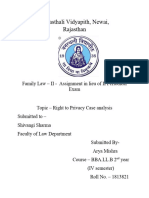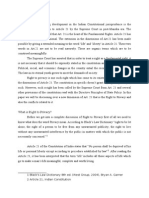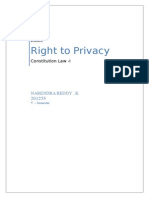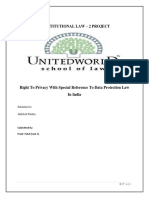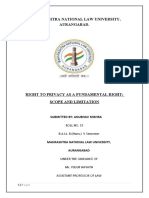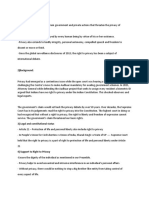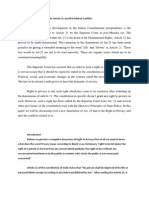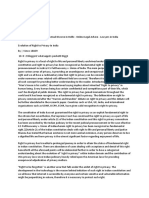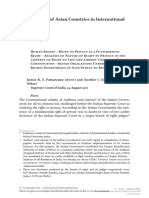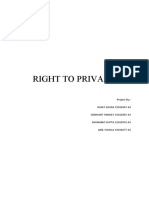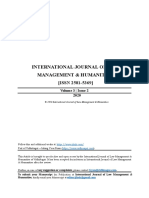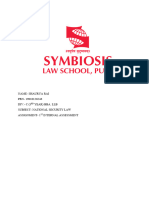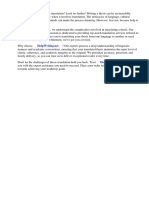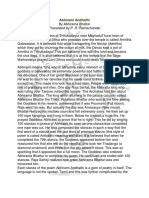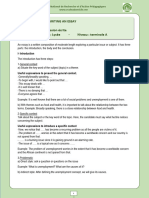NOVEMBER 2016 | ISSN: 2394- 5044 THE WORLD JOURNAL ON JURISTIC POLITY
RIGHT TO PRIVACY- IS UIDAI A VIOLATION OF AN
INDIVIDUAL’S ‘FUNDAMENTAL RIGHT’?
Sabreen Ahmed & Shubhankit Singh Sengar
University of Petroleum & Energy Studies, Dehradun
RIGHT TO PRIVACY
Right to privacy is vested within right to life and liberty under article 21.A citizen under
this right has the right to protect and safeguard the liberty of his own, his family, marriage,
procreation, motherhood, childbearing and education among other matters. Before getting
into the discussion of right to privacy and its infringement first we should be clear with the
word that is “Privacy”. According to black’s law dictionary “right to be left alone; right of a
person to be free from any unwarranted publicity; right to live freely from any unwarranted
interference by the public in matter with which public is not necessarily concerned”. The
expanded scope of article 21 has been explained by the apex court in Unni Krishnan v. State
of A.P1 providing that the ambit of article 21 also includes the various other rights as
mentioned below2:
1. Right not to be subjected to bounded labor and to be rehabilitated3 after release.
2. Right to hearing
3. Right to information
4. Right to privacy
5. Right to go abroad
6. Right to legal aid
7. Right against public hanging
8. Right to reputation
9. Right against solitary confinement
10. Right against delayed execution
11. Right of decent burial or cremation
12. Right to freedom from noise pollution
13. Right against custodial violence
14. Right against bar falters and handcuffing
1
(1964)1 SCR 332
2 Dr. Durga Das Basu, Introduction to the constitution of India 118(21st ed.,2013)
3 State of Madhya Pradesh v. Medha Patkar, AIR (2011) SC 3827(3832)
1 | © THE WORLD JOURNAL ON JURISTIC POLITY 2016. ALL RIGHTS RESERVED. | WWW.JURIP.ORG
�NOVEMBER 2016 | ISSN: 2394- 5044 THE WORLD JOURNAL ON JURISTIC POLITY
15. Right to family pension(release)
16. Right to good health4
17. Right to speedy, fair and open trail5
It was also observed in this case that Article 21 is the heart of fundamental rights and it
has extended the scope of Article 21 by observing that the life includes education as well
as, as the right to education flows from the right to life. The scope of article 21 is very
broad and it covers every aspect of life which is required for an individual to live a healthy
and secured life. If we talk of right to privacy then it also contains a broad scope in it like
tapping of telephonic conversation6, disclosure of dreadful disease7, right to privacy and
subjecting to medical tests8, women’s right to make reproductive choices.
In the case PUCL v. Union Of India9, with respect to the wiretapping of politician’s phone
calls to be considered as unconstitutional, it was held that The Right to Privacy has not
been itself identified under the constitution .As a concept it may be too broad and
moralistic to define it judicially .Whether the Right To Privacy can be claimed as or has
infringed in a given case would depend upon the facts of the given case. However the court
went on to hold that the “the right to hold a telephone conversation in the privacy of one’s
home or office without any interference can be claimed as right to privacy. From article 19
Right To Privacy can be derived as follows “When a person is talking on telephone, he is
exercising his freedom of speech and expression”, the court observed and therefore
“telephone-tapping unless it comes within the grounds of restriction under article 19(2)
would infract article 19(a) of the constitution”. In R.M. Malkani v. State of Maharashtra10,
the supreme court held that the telephonic conversation of an innocent citizen will be
protected by the court against the wrongful interference of tapping the conversation but
this protection does not stands for the guilty citizen against the efforts of the police to
vindicate the law and prevent corruption of the public servant. “Article 21 relates to
protection to life and liberty which enables the wife to live with human dignity. The
medical test conducted to decide whether the marriage has not been consummated owing
to the impotence of the husband could not be against his privacy”11. In the case of
Mohammad. Latif Bhat v. Shamima12 it is stated that, the right to privacy is not offended
so as to attract the immunity under article 21 of the constitution where a strong prima facie
case existed warranting the direction for medical examination of the petitioner for the
determination of impotency.
4Occupational Health & Safety association v. union of India, AIR (2014 )SC 1469
5 Vakil Prasad Singh v. state of Bihar, AIR (2009) SC 1822
6 supra
7 Mr. X v. Hospital Z,AIR (1995) SC 95
8Sharda v. Dharmpal,AIR (2003) SC 3450
9 AIR (1997) SC 568
10 AIR (1973) SC 157
11 B.Madhan v. N.S. Shanthakumari, AIR (2015) Mad 78.
12 AIR (2012) J&K 10 (137)
2 | © THE WORLD JOURNAL ON JURISTIC POLITY 2016. ALL RIGHTS RESERVED. | WWW.JURIP.ORG
�NOVEMBER 2016 | ISSN: 2394- 5044 THE WORLD JOURNAL ON JURISTIC POLITY
Not only this but recording the conversation of wife by husband without the knowledge
will also amount to infringement of her right to privacy as stated in the case of Rayala M.
Bhuvaneshwari v. Nagaphanender Rayala.13 Through these cases and the judgment given
by the court it is clear that right to privacy is not only a part of constitution but it also
contains different aspects that deals with different types of privacies that an individual have
irrespective of the status in society or relation with the person who’s right has been violated.
When tapping of telephonic conversation and reproductive choice can be considered as
right to privacy then how giving our biometric details cannot be considered as infringement
of right to privacy. The privacy based arguments have been used to support the conservative
claims that neither the government nor the fellow citizens can interfere with the traditional
practices merely for the sake of progressive ideas about marriage, family ,social life, or
citizenship.14 .
Right to privacy in India has evolved in three streams where first one deals with the
surveillance, second one dealing with the protection of autonomy of fundamental personal
choice from social morality and the last one deals with the main portion that is concern
with the biometrics and bodily privacy is restrictive under Indian laws. The identification
of prisoner act, 1920 and Indian evidence act,1872 provides the right to forcefully take
biometrics information’s of suspect and convict and court also allow non-consensual taking
of biometrics information for the welfare of public health and morality. In 2001,high court
of Andhra Pradesh has overturned the privacy argument to permit non-consensual HIV
test In certain condition15 and in the same year supreme court stated that non-consensual
administrative of truth serum, lie detectors and mind mapping does not violate the right
to privacy instead they offended the freedom of self -incrimination16. The Information
Technology Act,2000 contains several provisions for data protection. In April 2011,the
Ministry Of Information and Technology, notified rules17 under sec 43A in order to
define “sensitive personal information” and to prescribe “reasonable security practices” that
body corporates must observe in relation to the information they hold. Rule 3 of these
regulations also contain password, medical records, biometric, physical, physiological and
mental health conditions. Body corporate are forbidden by the rules from collecting
sensitive personal information unless:
(a) the information is collected for a lawful purpose connected with a function or activity
of the agency.
(b)the collection of the information is necessary for that purpose .18
13 AIR (2008) AP 98
14 State v. Rhodes, 61 N.C. 453, 459 (1868) (“We will not inflict upon society the greater evil of raising
the curtain upon domestic privacy, to punish the lesser evil of trifling violence)
15 M. Vijay v. Chairman, Singareni Collieries, AIR (2001) AP 502
16 Selvi v. State of Karnataka, (2010) 7 SCC 263
17 The Information Technology (Reasonable security practices and procedures and sensitive personal
information)
Rules, 2011. Available at http://www.mit.gov.in, last accessed September 15th, 2011
18 Rule 5 of the rules.
3 | © THE WORLD JOURNAL ON JURISTIC POLITY 2016. ALL RIGHTS RESERVED. | WWW.JURIP.ORG
�NOVEMBER 2016 | ISSN: 2394- 5044 THE WORLD JOURNAL ON JURISTIC POLITY
In addition to the restrictions on collection personal information or sensitive information,
body corporate must obtain prior consent from the “provider of information”. The body
corporate is required to take as prior steps in the circumstances reasonable 19.
Right to privacy is fundamental right which is provided to us by the constitution of India
irrespective of individual’s identity under article 2120. Right to privacy not only includes our
secured passwords on different social networking sites but it includes our smallest personal
information and UIDAI through his UID CARD scheme is directly infringing an
individual’s right to keep his personal information private. Unique identification authority
of India (UIDAI) is a governmental agency of New Delhi that serves as an issuing authority
of UID card and number’s, So the basic question which arises here is that how UIDAI
affects the Right to Privacy of an individual.
Before discussing how UID or Aadhar card infringes the right to privacy of an individual,
first we should know what is Aadhar card and how it is important that an individual have
to provide such personal information to these authorities. A unique identity card(UID) is
a card that is issued by the UIDAI a government authority to provide a unique identity to
an individual by obtaining his private information in the form of finger prints and vision
pattern.
UIDAI has also not mentioned clearly the use of the Aadhar card except mentioning that
it has many uses such as it can be used as identity proof and seeks to be a gateway to the
services, being sufficient to know your customers’ details in various things like opening a
bank account or getting mobile numbers or for various other government services.
As it is well known that UIDAI deals with issuing the Aadhar card to every individual of
the nation to provide them with a unique identity. So to provide every individual with a
unique identity, every individual who is UID card holder has to provide some general
details such as name, address, date of birth etc. and some specific details or the biometric
information such as vision pattern and finger prints. Physical structure and appearance of
an individual is considered as the most private thing that an individual hold. UIDAI in its
scheme is directly interfering with the physical body of
an individual who has to provide his biometric information aforesaid to get himself
registered in the government records. In the case of Mr CJ Karira v. Planning Commission,
government of New Delhi. This case pertains to an RTI application filed by the appellant
to UIDAI seeking information regarding the sharing of information concerning UID card
18Sub-Rule 5(3). One wonders about the convoluted language used here when a simpler phrase like
“take
reasonable steps” alone might have sufficed - reasonableness has generally been interpreted by courts
contextually.As the Supreme Court has remarked, “`Reasonable’ means prima facie in law reasonable
in regard to thosecircumstances of which the actor, called upon to act reasonably, knows or ought to
know.
and Sewage Board v. Unique Erectors (Guj) AIR (1989) SC 973
20 Govind v. state of Madhya Pradesh, AIR (1975) SC 1378
4 | © THE WORLD JOURNAL ON JURISTIC POLITY 2016. ALL RIGHTS RESERVED. | WWW.JURIP.ORG
�NOVEMBER 2016 | ISSN: 2394- 5044 THE WORLD JOURNAL ON JURISTIC POLITY
held by public authority. The appellant filed an appeal to central information commissioner
under section 19(1) of RTI act.
Talking about how UIDAI violates the Right to Privacy is that UDI for the unique
identification has allotted many government as well as private small organizations to get
the biometrics information due to which these private information of an individual can be
used by any organization or person for any purpose.
Providing our personal biometric information to non constitutional authorities for getting
unique identity to avoid the future problems of identification upto national level is same
as providing key of our homes to the police, when there has been a theft is some locality.
This UIDAI scheme is not only infringing the right to privacy of an individual but can be
seen as a nation threat as these UID cards or numbers are not just for civilians but also for
people in defense forces and security agencies where biometrics is not just affecting the
privacy but will work as a loop hole in national security.
Taking about the security of biometrics information in UID card then it is conducted in
two phases where initial stage is the collection of biometrics information is with the private
authorities in a very poorly and unorganized manner which results in various reports of data
breaches and the storage of these biometrics information in large deposits is considerable
risk for the security of these information’s and also these data of private information is
stored in central identities data repository from where hacking and destroying the data is
easily assessable.
In 2010, a bill was floated to lift the confidentiality of biometrics information, allowing it
to be sharing in the interested of national security21.
The security of biometrics information is considered as one of the most task of the
authorities due to which only in 2011, planning commission of India managed a group of
experts to suggest new aspects about the Indian privacy law. Justice Ajit P. shah who
chaired this committee suggested nine various principals of notice, informed consent and
opt out choices, collection and purpose limitation, access and correction, non-disclosure,
data security, openness and accountability. On this issue justice was contradicted by
attorney generals views who defended UID cards in supreme court of India. Attorney
supported his arguments with the outdated cases about the police power to seize and search
the private property22. Here supreme court held UID violating the right to privacy and if
an individual wants, can waive the right by voluntarily handling their biometrics
information but this argument was considered as against the public policy as if one can
waive this right then it will directly result in infringing the fundamental rights which
cannot be waived in anyway. This situation was affirmed by Supreme Court in 195823 .
21 Clause 33(b) of the National Identification Authority of India Bill, 2010
22 M.P. Sharma v. Satish Chandra, AIR (1954) SC 300 and Kharak Singh v.State of Uttar Pradesh, (1964) 1
SCR 332
23
Basheshar Nath v. Commissioner of Income Tax, AIR 1959 SC 149
5 | © THE WORLD JOURNAL ON JURISTIC POLITY 2016. ALL RIGHTS RESERVED. | WWW.JURIP.ORG
�NOVEMBER 2016 | ISSN: 2394- 5044 THE WORLD JOURNAL ON JURISTIC POLITY
The cure which the government has to look for to solve this problem is to completely
abolish this biometrics information providing system in UIDAI as it will not lead to any
security or privacy issue. By abolishing the system of biometrics information and just
providing general information can also lead to a proper identification of an individual and
on records of the government also.
But complete abolition of the UID will require lots of funds by the government and lots
of time and to get rid of all these things in a single solution is to destroy only the biometric
information and the general data should remains as it is. There has been a large amount
wasted of the government funds in this scheme of the government and UIDAI, which,
ultimately gave no solution about how to provide unique identity without infringing the
rights of the citizens.
Looking very deep into the topic we come across a very important aspect of government’s
continuous attempts to amending the fundamental rights as government is directly
affecting an individual’s right to privacy and creating a risk to their personal data which
should be kept safe. But it is laid down in the case of Keshavnanda Bharti v. State of
kerala24 that any part of the constitution can be changed except for the basic structure of
the constitution which also counts fundamental right.
The issue of Right to privacy has become quite subjective in today’s world .There are
confusions not only among the legislative bodies but the judiciary as well .What all can be
included within the definition of privacy and what all can be excluded is a question of
concern. The biometric informations so provided are important from the government’s
perspective and there lies a number of advantages like Aadhar based Direct Transfer
Subsidy, Jan Dhan Yojna , Passport in 10 days ,Digital locker, Voter Card Linking,
Monthly Pension Provident Fund Opening new bank account ,Digital Life Certificate and
SEBI facilities.
With the increasing amount of government schemes Aadhar Card is being considered
more important and mandatory for every individual who wants to avail the benefits of the
schemes so launched by the Government.
After all the advantages or disadvantages UIDAI may have the major question that remains
unanswered is whether it is against Right to Privacy or not.
In one of the articles ,Justice P.S Puttaswamy ,retired judge of Karnataka High court said
, “ There are no safeguards or penalties and no legislative backing for obtaining personal
information, and the proposed law introduced by the government has been rejected by the
Parliamentary Standing Committee on Finance. Provisions for collection and retention of
biometric data have been held impermissible in the United Kingdom and France by their
top courts.”25
24
(1973) 4 SCC 225
25
J.Venkatesan,Aadhar Infringes Privacy,THE HINDU, Sep 23 ,2013
6 | © THE WORLD JOURNAL ON JURISTIC POLITY 2016. ALL RIGHTS RESERVED. | WWW.JURIP.ORG
�NOVEMBER 2016 | ISSN: 2394- 5044 THE WORLD JOURNAL ON JURISTIC POLITY
Moreover, he alleged, that Aadhar numbers were given indiscriminately, including to
migrants without papers, creating a serious threat to national security. The executive order
was malafide as the whole object of rushing through the Aadhar schemes was to secure
“political gains”.26
Attorney General Mukul Rohatgi, while backing the Aadhar Card scheme ,has contended
that Right to Privacy is not a Fundamental right. “No judgment explicitly cites right to
privacy as a fundamental right. It is not there under the letters of Article 21 either. If this
court feels that there must be clarity on this subject, only a Constitution Bench can decide,”
he had said.
A trade-off between the Aadhaar and Right to privacy is incomprehensible.Our evolving
constitutional jurisprudence on privacy rights post M.P Sharma &Ors. v. Satish Chandra
,District Magistrate Delhi & Ors.27,unambiguously affirms the right to privacy as an
integral part of the right to life and right to personal liberty envisaged in the expansive
interpretation of article 21.
In Govind v. State of Madhya Pradesh 28,the Supreme court recognized the “man’s
involatile personality” ,the inner man, “rights inherent and inalienable” and “private space”
in which man may became and remain himself.
It also referred to article 8 of the European Convention on Human Rights which
recognizes the “right to respect for private and family life”29
The right to dignity since then has been declared by the Supreme Court as non-negotiable
constitutional right flowing from the spirit of the constitution and the explicitly guaranteed
“right to life and personal liberty” in article 21 .Importantly ,by equating “privacy-
dignity”claims and suggesting that these deserved to be “examined with care and to be
denied only when an important countervailing interest is shown be superior” ,the court
,following Kharag Singh ,by implication derived the right to privacy from the notion of
dignity of the individual .which while not specifically spelt out as a fundamental right is
referred to in the preamble of the constitution as an aim to be secured by and under the
national charter.
Declaring that article 21 clubs life and liberty, justice Krishna Iyer reminded us ,in the
context of interplay of articles 14,19,and 21 ,that “man is not disectable into separate limbs
and likewise cardinal rights in ,an organic constitution which make man “human” have a
synthesis”. Indeed Justice Iyer was endorsing the constitutional principle espoused by
26 ibid
27 (1954)AIR 300
28 (1975)SCR(3)946
29 The UN Charter (1945), Universal Declaration of Human Rights (1948) and the International
Covenant on Civil and Political Rights (1966), all of which have been ratified by India, affirm “the
natural dignity of man”
7 | © THE WORLD JOURNAL ON JURISTIC POLITY 2016. ALL RIGHTS RESERVED. | WWW.JURIP.ORG
�NOVEMBER 2016 | ISSN: 2394- 5044 THE WORLD JOURNAL ON JURISTIC POLITY
Justice Cardoza that “kindered aims shade off into one another by imperceptible
gradations”30
A holistic reading of the constitutional jurisprudence would demonstrate that the rights
to privacy is firmly embedded in our constitutional scheme as a non-negotiable imperative
that owes no apology to a myopic view of our republican charter .Indeed considering a
fundamental principles of the nation as not “rules for passing hour, but principles for an
expanding future “,the apex court as the ultimate arbiter of constitutional conscience ,has
given fundamental rights their meaning in new settings consistent with the aspirations of
our people .This is so that we may have a ‘living constitution’ which can protect, preserve
and defend sacrosanct libertarian values that remain the bedrock of the republic and
constitute the core of the Constitution .Rather than deny us our constitutional right, the
Union government ought to enact a privacy legislation to clearly define the rights of citizens
consistent with the promise of the constitution 31. In Indian constitution right to privacy is
not expressly recognized under fundamental rights as an article but right to privacy is
considered as ‘penumeral right’ in the constitution and after the case of Govind v. state of
Madhya Pradesh32 the Supreme Court for the first time recognized the right to privacy
which is implicit in the constitution under article 21. The Supreme Court held that right
to privacy is an integral part of right to life which straight away denies the statement of
Attorney General Mukul Rohatgi right to privacy is not a fundamental right. Seeing the
other side of his statement which signifies that being well aware with the laws he should
have known the fact that right to privacy is a universally recognized human right. Referring
to the pronouncements made in A.K Gopalana, Maneka Gandhi and Bank Nationalization
cases ,the top law officers has said “that inconsistencies with regard of certain fundamental
rights can only be “squared up” by a large bench”. The Supreme Court of America has
identified associational privacy, informational privacy, anonymity, and privacies of religion
,thought and intellects requirements of first amendments ,giving rise to a robust First
Amendment jurisprudence of privacy and private choice.33 The concept of privacy plays a
major role in jurisprudence of the first but also the Third, Fourth, Fifth and Fourteenth
amendment .First amendment privacy law is especially in rich context for freshly assessing
the past success and future potential of privacy concept-based jurisprudence as an
instrument of progressive social change for African Americans ,women, gay ,lesbian and
30 Benjamin N. Cardozo, The Nature of the Judicial Process.
31 Ashwani Kumar privacy,a non-negotiable right,THE HINDU,Aug 10,2015
32 AIR 1975 SC 1378
33
McIntyre v. Ohio Elections Comm’n, 514 U.S. 334, 357 (1995) (holding that a state may not ban
anonymous political literature opposing taxes); Yoder, 406 U.S. at 234 (holding that a state may not
require members of the Amish faith to send children to school pursuant to compulsory schooling
laws that violated their religious beliefs); Stanley, 394 U.S. at 568 (holding that criminalizing the mere
possession of obscene material in the home is prohibited by the First and Fourteenth Amendment);
Patterson, 357 U.S. at 466 (holding that a state may not require organization to reveal names of its
rank-and-file members)
8 | © THE WORLD JOURNAL ON JURISTIC POLITY 2016. ALL RIGHTS RESERVED. | WWW.JURIP.ORG
�NOVEMBER 2016 | ISSN: 2394- 5044 THE WORLD JOURNAL ON JURISTIC POLITY
bisexual Americans.34 In the background of the question raised whether Aadhar infringes
the right to privacy or not the centre replied to the Supreme Court on july 22, 2015 that
privacy was not a fundamental right. Attorney General said that right to privacy was not a
fundamental right as mentioned earlier as well,he even quoted the cases like the Kharag
Singh case where the Supreme Court has held the Right To Privacy was not a “guaranteed
right” under the constitution .The second amendment would appear little to do with
privacy .35But the jurisprudence of second amendment has come to incorporate ideals of
the places we live in as protective sanctums wherein privileges of self-defense and
ownership are inconsistent with gun control laws that rule out the private decision to
possess readily operable handguns in private homes .For example ,the court recently stuck
down a local Washington D.C law prohibiting possession of unlicensed fireman possession
,including in private homes ,on the grounds that the second amendment confers on an
individual an individual right to protect themselves and their families.36 It clearly shows
that the jurisprudence be that of India or America has emphasized on the question of
privacy either implicitly or explicitly from time to time.
Conclusion
The above discussion of right to privacy and how unique identity affects the right to privacy
provided to us by Indian constitution we have concluded that as far as biometric
information is concerned in the UDI it is infringing the right to privacy of the individuals
and would cause serious issues with individual’s as well as national security.
From time to time Supreme Court has recognized right to privacy as a fundamental right
no matter on what grounds the centre has denied it as a fundamental right .The
constitutional jurisprudence has also recognized the right to privacy as an ultimate right to
protect individual’s private or personal life .UIDAI is definitely violative of the fundamental
right of privacy as it misuses the personal information for a variety of purposes not only by
government organization but also private institutions. The cure which the government has
34Wallace v. Brewer, 315 F. Supp. 431 (M.D. Ala. 1970) (finding that a state may not demand names
and registration of members of a Nation of Islam group that purchased land in state)
35 It reads: “A well regulated Militia, being necessary to the security of a free State, the right of the
people to keep and bear Arms, shall not be infringed.” U.S. CONST. amend. II.
36 District of Columbia v. Heller, 554 U.S. 570, 635–36 (2008) (“[W]e hold that the District’s ban on
handgun possession in the home violates the Second Amendment, as does its prohibition against
rendering any lawful firearm in the home operable for the purpose of immediate self-defense. . . .
[T]he enshrinement of constitutional rights necessarily takes certain policy choices off the table. These
include the absolute prohibition of handguns held and used for self-defense in the home.
Undoubtedly some think that the Second Amendment is outmoded in a society where our standing
army is the pride of our Nation, where well-trained police forces provide personal security, and where
gun violence is a serious problem. That is perhaps debatable, but what is not debatable is that it is not
the role of this Court to pronounce the Second Amendment extinct.” (emphasis added)). In
McDonald v. City of Chicago, 130 S. Ct. 3020, 3026 (2010) (Alito, J.), the Supreme Court held that the
Fourteenth Amendment makes the Second Amendment right to bear arms as articulated in Heller
fully applicable to the States
9 | © THE WORLD JOURNAL ON JURISTIC POLITY 2016. ALL RIGHTS RESERVED. | WWW.JURIP.ORG
�NOVEMBER 2016 | ISSN: 2394- 5044 THE WORLD JOURNAL ON JURISTIC POLITY
to look for to solve this problem is to completely abolish this biometrics information
providing system in UIDAI as it will not lead to any security or privacy issue. By abolishing
the system of biometrics information and just providing general information can also lead
to a proper identification of an individual and on records of the government also .An
individual has a lot of privacies and among all his body is the most private things that
belongs to him .The finger prints or the retina scan or any other biometric method of
storing one’s personal information and then using it without his consent is totally violative
of the fundamental right of Right To Privacy envisaged in Right to life under article 21
forming the heart of fundamental rights.
10 | © THE WORLD JOURNAL ON JURISTIC POLITY 2016. ALL RIGHTS RESERVED. | WWW.JURIP.ORG






